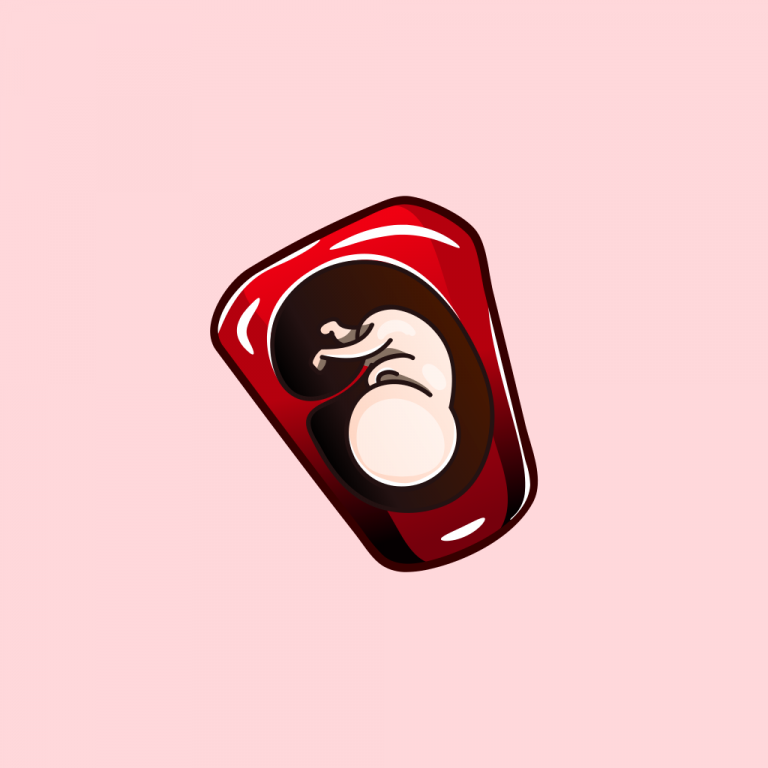Congratulations—Week 4 is here! For many, this is when pregnancy first becomes real. You may have just experienced a missed period, or you might be feeling early hints that something special is happening. This week marks an important milestone: your tiny baby is now called an “embryo” and is settling into their new home in your uterus.
Right now, your baby is no bigger than a poppy seed, but big things are in motion. The embryo is made up of layers that will soon become your baby’s organs, nerves, and skin. The placenta and umbilical cord are also beginning to form to support your little one’s growth throughout the coming months.

You might be wondering when to take a pregnancy test. By Week 4, most at-home tests can give you an accurate result. A positive test can feel exciting, overwhelming, or even a little nerve-wracking—these feelings are all completely normal. Try to give yourself grace as you adjust to this incredible news.
If you’re not feeling many symptoms, don’t worry! Some women notice tender breasts, mild cramping, or more trips to the bathroom, while others feel just like usual. Every pregnancy is different, and not everyone experiences early signs. The important thing right now is to take care of yourself—drink plenty of water, eat nourishing foods, and get enough rest.
- Consider starting a prenatal vitamin: Folic acid is especially important for your baby’s early development.
- Cut down on smoking, alcohol, and certain medications: These can interfere with healthy growth at this crucial stage.
- Jot down questions: It’s normal to have a lot on your mind. Write your questions down so you can ask your doctor at your first visit.
Remember, you’re not alone in this journey. Whether you’re surprised, thrilled, or feeling a little anxious, each emotion is valid. Week 4 is about new beginnings and gentle self-care. Give yourself time to process and, when you’re ready, reach out to loved ones or healthcare providers for support. There’s a whole community rooting for you and your little one every step of the way.
Your Baby’s Development This Week
Welcome to week 4 of your pregnancy! At this stage, you may not even know you’re pregnant yet, but big things are happening behind the scenes. Even though your baby is tiny—just about the size of a poppy seed—the first building blocks are being set in place for all the organs and systems your little one will need to grow and thrive.
Right now, your baby is called a blastocyst, which is a tiny ball made up of hundreds of cells. Your blastocyst is busy finding its spot in the soft lining of your uterus in a process called implantation. You might notice a bit of light spotting or mild cramping as this happens. It’s perfectly normal and nothing to worry about, though not everyone experiences it.
After this, those small but mighty cells start to organize themselves into layers, each layer having a special job in forming your baby’s body. Here’s a simple way to imagine it:
- The innermost layer will eventually become important organs like the lungs, liver, and stomach.
- The middle layer is hard at work forming what will be your baby’s heart, muscles, bones, and blood vessels.
- The outer layer will grow into your baby’s delicate skin, tiny hair, shiny eyes, and even the brain and nervous system.
At week 4, two important protective structures are also beginning to appear: the amniotic sac and the yolk sac. The amniotic sac is like a soft water balloon that surrounds your baby, keeping them safe and cushioned. The yolk sac is the first source of nourishment, providing what your developing baby needs until the placenta—a special organ that will handle nourishment and waste—fully forms over the next several weeks.
Another vital development this week is the very early beginning of your baby’s neural tube. This fragile, tiny structure will soon grow into your baby’s brain, spinal cord, and backbone. That’s why it’s especially important to make sure you’re getting enough folic acid right now, as it helps prevent rare but serious problems with the brain and spine. If you haven’t started taking a prenatal vitamin, this is a great time to begin.
Don’t worry if you don’t feel any different just yet—most women don’t experience strong pregnancy signs at four weeks. Some might have a missed period, a bit more tiredness than usual, or sensitive breasts. All these quiet changes mean your body is beginning its journey to support your growing baby.
As amazing as it sounds, everything your little one needs to become a full-fledged baby is already on the roadmap. Every day, thousands of tiny changes are happening, setting the stage for all the exciting milestones to come. Be gentle with yourself, get plenty of rest, and remember that you’re already doing an incredible job nurturing new life.
Changes in the Mother’s Body
At week 4 of pregnancy, you may be just starting to sense that something is different—even if you’re not entirely sure what’s going on yet. This can be an exciting and sometimes confusing time because the changes happening inside your body are mostly invisible, but they’re laying the foundation for your whole pregnancy journey.
For many women, the earliest sign is a missed period. If your cycle is regular, not getting your period as expected can be the first clue. Even if you haven’t taken a pregnancy test yet, you might notice your body starting to send its own subtle signals.
- Breast Sensitivity: Your breasts might feel fuller, sore, or extra sensitive. Some women notice their bras fit more snugly, and the nipples may tingle or darken slightly as your hormones shift and prepare your body for the future.
- Feeling Tired: It’s perfectly normal to feel more tired than usual. This early fatigue happens because your body is working round the clock to support the tiny life just beginning inside you. Even a full night’s sleep might leave you wanting a nap.
- Mild Cramps and Spotting: Light cramps, similar to those before a period, can be present. Some women notice very slight spotting—pink or brownish—which is usually a harmless sign of the embryo settling into the uterus. This is known as implantation bleeding and is typically much lighter than a usual period.
- Emotional Changes: You may experience mood shifts—feeling joyful, anxious, or unusually emotional. This is common as pregnancy hormones like hCG and progesterone increase rapidly, affecting both your body and your feelings. Remember, it’s ok to feel a mix of emotions during this big life change!
You may also notice changes in your appetite or become sensitive to certain smells, even at this early stage. Some moms-to-be feel early signs of nausea, often called “morning sickness,” though it’s just as likely to strike in the evening or not at all yet. Your sense of taste might shift, and foods you once loved could suddenly seem unappealing.
Behind the scenes, your body has begun to produce higher levels of a hormone called hCG (human chorionic gonadotropin)—the same hormone that home pregnancy tests look for. This hormone signals your body to stop releasing eggs and helps maintain the thick lining of your uterus, giving your baby the best environment to grow.
It’s important to remember that every pregnancy is unique. Some women will notice clear early signs, while others may barely feel different during these first few weeks. If you’re tuning in to your body, try to be gentle with yourself. Get plenty of rest, eat nourishing foods, and listen to what you need. Light exercise, like walking, can help you feel energized and reduce stress.
Most importantly, don’t hesitate to reach out to your healthcare provider with any concerns or questions. They’re there to support you from the very beginning, ensuring you and your baby get off to the healthiest possible start.
Your First Medical Steps at Week 4: What to Know
Reaching week 4 of pregnancy is exciting, but also filled with questions—especially if this is your first time. While your baby is just beginning to grow, there are important things you can do now to set the stage for a healthy pregnancy. Here’s what you need to know about medical checkups and screenings at this very early stage:
- Schedule a Prenatal Visit: If you think you might be pregnant (for example, you’ve missed a period or have a positive home test), it’s smart to reach out to your healthcare provider soon. They’ll help confirm your pregnancy and explain what to expect next. Even though your first in-person checkup may be a few weeks away, letting your doctor know early is the best way to get support and answers tailored to you.
- Review Your Health History: Your provider may ask about your medical background, family health history, and any medicines you’re taking. This helps them spot anything that could be important for you or your baby’s health — and gives you a chance to ask about questions or worries you have.
- Guidance on Supplements: Your provider will make sure you’re getting enough folic acid and might recommend starting or continuing prenatal vitamins right away. Folic acid is especially important now as your baby’s brain and spinal cord are starting to form.
- Advice on Lifestyle: You’ll get advice about what to eat, what to avoid (like alcohol and certain medications), and which habits are healthiest for early pregnancy. Your provider can also clear up any confusion about exercise and daily activities.
- No Routine Screening Tests Yet: At week 4, routine medical tests like blood work or ultrasounds usually aren’t done unless you have special health concerns. Most first screenings and physical exams are planned for a little later, often around weeks 7 or 8.
- What to Watch For: If you notice unusual symptoms—like severe pain, heavy bleeding, or dizziness—call your healthcare provider right away. Most changes at this point are gentle, such as mild cramping or light spotting, but it’s always better to check if you’re unsure.
Remember, even if your first big prenatal appointment isn’t right now, starting the conversation with your provider at week 4 means you’re already taking important steps to care for both yourself and your baby. Your provider is there to help answer any questions, ease your worries, and make your pregnancy journey as smooth as possible.
Nutritional Tips and Physical Exercise
Congratulations on reaching week 4 of your pregnancy! This is an exciting time, and taking care of your health now will help lay the foundation for your baby’s growth and your own well-being. Let’s look at some practical nutrition and exercise advice designed just for this early stage.
- Choose Colorful Meals: Include a wide variety of colorful vegetables and fruits in your daily meals. Berries, spinach, sweet potatoes, and peppers all offer unique vitamins and minerals your baby needs as they start to develop their organs and nervous system.
- Build Balanced Plates: Aim to include a little bit of everything in your meals: whole grains (like oats or brown rice), lean proteins (such as eggs, beans, or chicken), and healthy fats (think olive oil, avocado, or nuts). This balance helps with steady energy and healthy development.
- Watch Your Portions: In early pregnancy, you don’t actually need to “eat for two.” Listen to your body’s hunger cues. If you feel more hungry than usual, reach for wholesome snacks like yogurt with a sprinkle of seeds, or sliced fruit with nut butter.
- Keep Up with Your Prenatal Vitamin: Continue taking your daily prenatal vitamin. If you’re new to prenatal supplements, let your doctor know which one you’ve chosen. They can help make sure it has the right nutrients, especially the folic acid that’s so important right now.
- Stay Mindful of Fluids: Make it a habit to sip water often throughout the day. Carry a water bottle so you remember. If plain water is hard to drink, try adding a squeeze of lemon or a few berries for flavor.
- Limit Sugary Drinks and Junk Food: Try to steer away from sodas or heavily processed snacks. While the occasional treat is okay, focusing on natural, whole foods will do the most good for you and your growing baby.
- Food Safety First: To avoid illness, wash produce well, cook meats thoroughly, and skip raw fish or unpasteurized cheeses for now.
Keeping active is also safe and healthy during these early weeks, as long as you feel up to it. Here’s how you can move your body gently and safely:
- Go for Easy Walks: Walking is a great choice—it keeps your blood moving, relieves stress, and can help with mild pregnancy discomforts like bloating or mood swings.
- Try Stretching or Gentle Yoga: Simple stretching routines or a prenatal yoga video can help you relax and stay flexible. Make sure the moves are gentle and avoid any positions that feel uncomfortable.
- Listen to Your Body: It’s normal to feel more tired than usual right now. If you’re not up for a walk or exercise, don’t force yourself. Even a few deep breaths or a quiet moment with your feet up counts as self-care.
- Avoid High-Risk Activities: Skip activities with high risk of falls or injury, such as contact sports or high-intensity workouts, unless your provider says otherwise.
Every woman’s pregnancy is unique. If you have a medical condition or feel unsure about eating certain foods or starting exercise, talk with your healthcare provider for advice tailored to you. Your body is doing something truly incredible—be kind and patient with yourself as you nourish and care for both of you!
Weekly Checklist
Congratulations—you’ve made it to week 4! Right now, your body is working hard behind the scenes, and you may just be starting to notice the first signs of pregnancy. Here are some helpful steps for this important week:
- Take a Home Pregnancy Test (if you haven’t already): If your period is late, this is a good time to check if you’re pregnant. Be sure to follow the directions closely for the most accurate result.
- Call Your Healthcare Provider: Make an appointment to confirm your pregnancy and start your prenatal care journey. Early guidance sets you up for a healthy pregnancy.
- Start or Continue a Prenatal Vitamin: Double-check that your vitamin has enough folic acid (400–1,000 mcg daily). This helps your baby’s brain and spine form properly.
- Eat a Variety of Nutritious Foods: Try adding a rainbow of fruits and veggies to your meals. Whole grains, lean meats or plant proteins, and healthy fats all help support your growing baby from the very start.
- Stay Well Hydrated: Carry a water bottle and sip throughout the day. Aim for at least 8 glasses daily to keep your energy up and support your baby’s development.
- Steer Clear of Harmful Substances: Skip alcohol, limit caffeine to one small cup per day (if any), and avoid smoking and other harmful substances.
- Rest as Much as You Can: You might feel more tired than usual. Try to go to bed a bit earlier or squeeze in a short nap if you’re able—it’s your body’s way of supporting your pregnancy.
- Listen to Your Body: Notice any mild cramping, tender breasts, or spotting. These are common as the embryo settles in, but call your doctor if you have any concerns.
- Plan Ahead: If you have any chronic health issues or take medication, talk with your healthcare provider as soon as possible to make sure everything is safe for pregnancy.
- Celebrate This Moment: Whether you share your news now or wait a little longer, it’s okay to feel excited, nervous, or a mix of both. Take a deep breath—you’re doing great!
When to Call Your Provider
During week 4 of pregnancy, most women feel perfectly fine or might notice only a few mild changes. However, while some symptoms are completely normal, there are certain signs and situations when it’s important to reach out to your healthcare provider. Remember, it’s always better to ask—even for what might seem like small concerns. You and your baby’s well-being come first.
- Heavy Bleeding: Light spotting can be normal in early pregnancy, but if you experience heavier bleeding—enough to soak a pad, or passing clots—it’s important to contact your doctor right away.
- Strong or Unusual Pain: Mild cramping is to be expected, but sharp, severe pain that doesn’t go away—especially on one side of your lower belly—should be checked as soon as possible.
- Dizziness or Fainting: If you feel very dizzy, like you might pass out, or you actually do faint, let your doctor know immediately.
- Fever or Chills: A high fever (over 100.4°F or 38°C) or shaking chills that don’t go away could mean an infection that needs treatment.
- Strong Smelling or Unusual Vaginal Discharge: While light discharge is normal, if it has a foul smell, changes color (greenish or yellow), or is accompanied by itching, give your provider a call.
- Severe Nausea or Vomiting: Occasional queasiness is common, but if you can’t keep any food or water down for more than a day, reach out so you don’t get dehydrated.
- Sudden Swelling: Noticeable puffiness in your face, hands, or around your eyes this early isn’t typical—mention it to your provider to be sure it’s nothing serious.
- Any Worsening Symptoms: If something just doesn’t feel right—whether it’s unusual pain, anxiety, or you’re not sure about a symptom—trust your instincts and check in with your provider.
It’s completely normal to have questions and worries, especially at the start. No concern is too small when it comes to your health and your baby. If you’re unsure, call your provider just to be safe—they’re there to support you every step of the way.
Preparations for Baby
Week 4 may not feel much different yet, but now is the perfect time to start getting ready for your baby’s arrival—both in your heart and your home. Even though your little one is still tiny, setting some gentle routines and small habits now can make the months ahead feel calmer and more joyful. Here are some ways to nurture yourself and prepare for the exciting journey ahead:
- Celebrate the Moment: Take a quiet moment to honor this new chapter. Even a simple journal entry or a small treat can mark the start of your pregnancy in a meaningful way.
- Create a Restful Space: Think about where you can relax at home, especially during days when you feel extra tired. Add a cozy blanket, soft pillow, or calming scent to make it extra inviting.
- Let Loved Ones In: Lean on your support circle—whether that’s a partner, family, or close friends. Now is a good time to share your news with someone you trust, or simply ask for a little extra kindness when you need it.
- Start Healthy Routines: Begin gentle habits like setting a regular bedtime, planning balanced meals, or going for short daily walks. These will help your body feel its best as your pregnancy moves forward.
- Make a “Questions” List: As thoughts or worries pop up, jot them down in a notebook or phone. Bring these with you to your first prenatal appointment so you won’t forget to ask anything that’s on your mind.
- Consider Your Calendar: Look ahead to rearrange any big commitments or travel plans. This can help reduce stress and give you peace of mind for the weeks ahead.
- Gather Practical Info: Read up on early pregnancy topics or listen to a trusted pregnancy podcast. Keep reading and listening to Stork Advisor®️content. Learning a little at a time keeps things from feeling overwhelming.
- Be Kind to Yourself: However you’re feeling right now—excited, nervous, or even unsure—is completely okay. Give yourself grace and remember, every pregnancy journey is unique.
You don’t need to have everything figured out today. Taking small, thoughtful steps now will help you feel more comfortable and confident as your baby grows. You’ve got this—and you’re already doing an amazing job.
Citations and References
- American College of Obstetricians and Gynecologists (ACOG) – Recommends early prenatal visits and folic acid supplementation to reduce neural tube defects risk. Visit Source
- Centers for Disease Control and Prevention (CDC) – Provides guidance on folic acid, nutrition, and early pregnancy care. Visit Source
- Mayo Clinic – Details fetal development at week 4, early symptoms, and nutritional advice for early pregnancy. Visit Source
- Cleveland Clinic – Explains implantation, early fetal growth, and what to expect in the first month of pregnancy. Visit Source
- National Institutes of Health (NIH) MedlinePlus – Outlines early pregnancy changes, essential prenatal vitamins, and maternal care. Visit Source
- World Health Organization (WHO) – Advocates for antenatal care, nutrition, and substance avoidance in early pregnancy. Visit Source
- Nemours KidsHealth – Describes week 4 embryonic development, the formation of essential layers, and early pregnancy symptoms. Visit Source
- NHS (National Health Service, UK) – Offers advice on week 4 fetal development, early symptoms, and starting prenatal supplements. Visit Source










